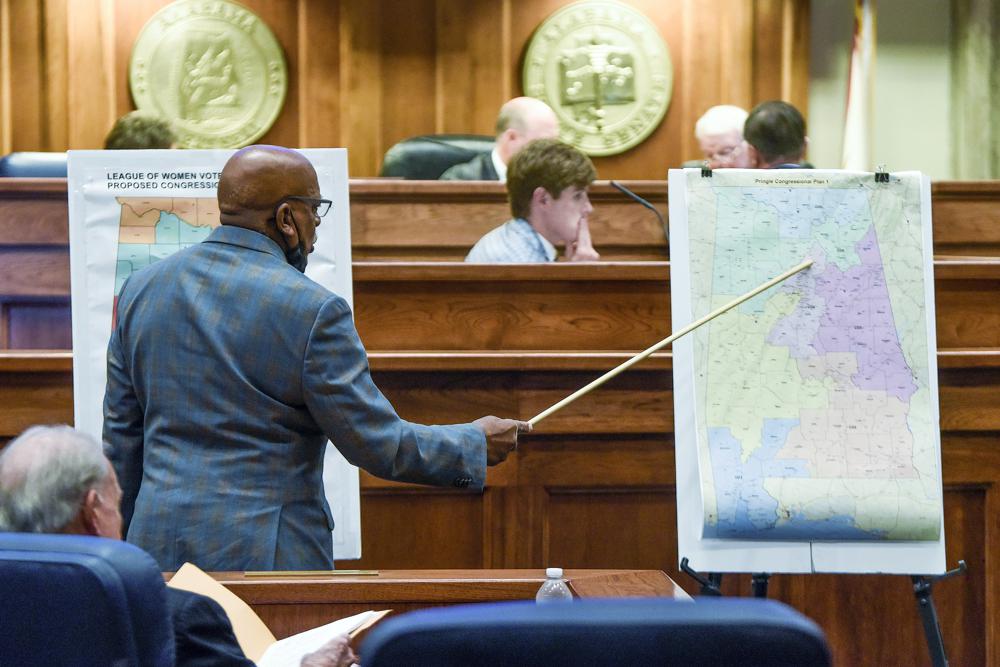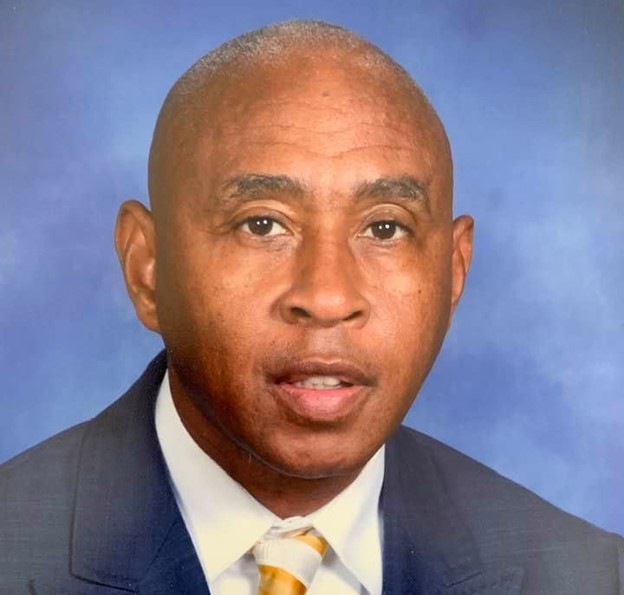Federal court hearing on redistricting case set for today

The entire political world in Alabama will be watching Monday to see what the court does with Alabama’s disputed redistricting case. A hearing is scheduled for Monday, August 14, in federal court at 9:00 a.m. CDT at the Hugo L. Black United States Courthouse in Birmingham. The hearing will focus on whether the map recently passed by the Alabama State Legislature complies with section two of the Voting Rights Act of 1965. Civil rights groups sued the state challenging the redistricting map that the Legislature passed in 2021. A three-judge panel of the Eleventh Circuit Court of Appeals in Atlanta ordered a halt to the 2022 election over concerns the map violated the 58-year-old Voting Rights Act. The U.S. Supreme Court intervened at the request of the state and allowed the election to proceed with the 2021 map. In June, the Supreme Court ruled in a 5 to 4 ruling that the congressional map likely violated the VRA and referred the case back to the three-judge panel. The Legislature was given until July 21 to submit a new map. The parties that sued the state and Alabama Democrats had wanted the Legislature to submit a map with two majority-minority districts. The Legislature, voting along party lines, refused and instead introduced and passed a controversial new map that simply increased Alabama’s Second Congressional District from 30% Black to 39.9%. That map kept the Gulf Coast, the Wiregrass, and Montgomery County whole; but was denounced by Democrats. The civil rights groups suing the state in federal court in Allen versus Milligan are asking the court to reject this new map. Members of the Alabama House Democratic Caucus, including House Minority Leader Anthony Daniels (D-Huntsville), will be outside the courtroom on Monday to issue their response following the conclusion of Monday’s hearing. Joining Daniels will be Caucus Chair Barbara Drummond (Mobile), Caucus Policy Chair Adline Clarke (Mobile), Caucus Secretary/ Treasurer Kelvin Lawrence (Hayneville), Rep. Patrice McClammy (Montgomery), Rep. Phillip Ensler (Montgomery), Rep. Chris England (Tuscaloosa), Rep. Patrick Sellers (Birmingham), Rep. Rolanda Hollis (Birmingham), Rep. Curtis Travis (Tuscaloosa), Rep. Napoleon Bracy (Mobile), Rep. Tashina Morris (Montgomery), Rep. A.J. McCampbell (Demopolis), and Rep. Sam Jones (Mobile) to comment on the court proceeding. “As we gather for the August 14th federal court hearing in Birmingham, Alabama, surrounded by the hallowed sites of the Civil Rights movement, we are reminded that this moment is inseparable from that struggle,” Daniels said. “We hope and pray that this court hearing, this next step, is a step forward on a continued path towards fair representation for all.” The Alabama House Democratic Caucus endorsed a redistricting plan, proposed by the Milligan and Caster plaintiffs, that would have created two majority Black congressional districts while respecting traditional redistricting guidelines. That map was rejected by the Republican supermajority and largely excluded from consideration during the legislative process. The major party primaries are on March 5, with candidate qualifying opening on October 16, so knowing where the congressional district lines are for that pending election is of some importance. To connect with the author of this story or to comment, email brandonmreporter@gmail.com.
House Democrats urge passage of strong gun laws to curb gun violence, not more prisons

On Wednesday, members of the Alabama House Democrat Caucus held a press conference to promote their bills to curb gun violence by passing more restrictions on guns. Democratic lawmakers Chris England, Phillip Ensler, and Ontario Tillman have all sponsored bills that would add certain restrictions on gun owners in Alabama. The legislators oppose the permitless carry bill that was passed last year and became law at the first of this year. “Requiring a permit makes it easier for us to recognize who is supposed to have guns,” England said. There is, “An 11 percent increase in homicides in states that have passed similar laws.” Alabama Today asked that instead of putting government limits on guns, why not build more prisons to lock up more people for longer periods of time that commit serious crimes. “There is no correlation between firearm possession and the access to them and the number of prisons that we have,” England said. “We’re lawmakers. We’re responsible for governing systems. It is impossible to suggest to people that we are governing systems if our only answer is to build more prison space; because we can’t afford it at this point, and also building more prison space will not remove the proliferation of guns we have seen since January First of this year. It is indisputable at this point that there are more guns on our streets now than ever before in our history because it is easier for people who shouldn’t have them to carry them in public. I don’t know how that helps us in regard to public safety, and it certainly does not help us when we talk about adding more prison space.” “Some of these proposals do have criminal penalties if someone violates them, so we all believe to be clear in accountability and enforcement, but building more prisons and locking people up for life for committing a crime is not where we stand,” Ensler said. “What we are saying is yes, if you commit a crime, there should be consequences, but if we want to get into the conversation of building more prisons, we need to focus on, as we have talked many times as a Caucus, is having better reentry programs. Having better services that help people stay out of prison in the first place. So, absolutely no. Building more prisons is not the solution to this. That would be an easy and cowardly way to try to address the issue.” “We are a solution looking for a problem,” Tillman said. “We are fighting the symptoms instead of the root cause. The reason why people are in prison is because they have been convicted of a serious crime or a crime attaching prison time along with it. What we need to address is the problem of gun violence. We need to reduce it. We need to curb it. We need to stop letting our children be gunned down at their workplaces, at their churches, and different places like that. This is supposed to be a safe haven. What we need to do is represent all of the people of Alabama and protect the citizens of Alabama.” “There is nothing normal or acceptable about this,” Tillman said of gun violence. “We are here today because we refuse to accept this as the new normal.” “The leading cause of death of children in Alabama is gun violence,” Tillman said. “We are not trying to take away the Second Amendment rights of people to own guns.” Tillman expressed his support for red flag laws, outlawing the Glock Switch, and “repealing dangerous laws like the before mentioned concealed carry.” “These are common sense proposals that the majority of people support,” Tillman said. “Gun violence is an epidemic that is impacting everyone,” Ensler said. “These are reasonable proven measures that have worked in other cities and other states, including in Republican states.” “Rep. Drummond has been working on a bill that has gotten out of committee legislation to keep guns off of school campuses and making sure that parents are responsible,” Ensler said. Ensler has introduced eight different measures. These include a ban on trigger activators or ‘Glock switches,’ a ban on ghost guns- guns that do not have serial numbers, a line item in the budget to fund hospital-based violence intervention programs in trauma centers, a red flag law, more mental health counselors in schools, and more, the creation of a grant program through ADECA for cities to implement programs to end gun violence. “This is a preventable crisis,” England said. Thursday will be day 15 of the 2023 Alabama Regular Legislative Session. To connect with the author of this story or to comment, email brandonmreporter@gmail.com.
Alabama lawmakers set to focus on Jobs Act and economic incentives for 2023 session

Now that the Alabama Special Session is done and ARPA funds have been allocated, leaders can focus on the 2023 regular session that begins on Tuesday. Speaker of the House Nathaniel Ledbetter explained that the Alabama Jobs Act would be one of their first priorities. “(The Alabama Jobs Act) is going to be priority No. 1 coming back after break. I think you’ll see a big push for that,” Ledbetter stated. “They’ve been very positive for our state. We’ve seen the job growth has been tremendous because of it. We’ve looked at the numbers; we got a return on the investment of 173% over a 20-year period.” Ledbetter believes legislation on this needs to be done quickly. The Alabama Jobs Act, created in 2015 and set to expire this year, has netted $256.8 million in incentives, Secretary of Commerce Greg Canfield reported in 2022. This amount outpaced the department’s benchmark of $164.6 million. The Joint Study Commission on Renewing Incentives has discussed extending the Jobs Act through 2028 with a higher payout cap. Legislation has not been filed yet. The Jobs Act created two separate incentives: The Alabama Jobs Credit and Alabama Investment Credit. The Jobs Credit gives companies cash rebates on their previous year’s payroll for qualified employees, and companies can get higher rebates if they locate in rural parts of the state or hire veterans. The Investment Credit addresses a company’s capital investment and can be applied to several taxes, including income. Companies can receive incentives for up to 10 years. The incentives are currently capped at $350 million annually . Canfield said the Jobs Act has helped the state recruit 217 projects creating more than 38,000 jobs, and he believes the $350 million cap should be increased. Canfield discussed on Twitter how rural areas have benefited from the Jobs Act as much as urban areas. “We are going to continue to build on that success,” Canfield stated. “Alabama has led the Southeast in economic development, job creation, and industrial recruitment for roughly 20 years, and much of that success is the result of the incentives we offer,” Lt. Governor Will Ainsworth told Alabama Daily News on Thursday. “If we are going to continue that incredible success for decades to come, our incentives must remain competitive with those offered by our sister southeastern states, and this proposal does just that in a conservative, common sense manner. The pay-as-you-go package we have crafted also ensures taxpayers are protected from companies that are unable to fulfill their commitments.” Other recommendations from the task force in December included: Several lawmakers agreed that focusing on the Jobs Act is a priority for the Legislature. “When we come back, the economic incentive package to me is the No. 1 priority,” Rep. Marcus Paramore stated. “I want to make sure that gets done, make sure it gets out, make sure we can continue to recruit good businesses and good high-quality jobs for our constituents.” Rep. Phillip Ensler said, “But as with any bill, I want to look at the details, and having it done in a way that is equitable and making sure that we’re doing it in a way where the numbers of it make sense.” Lawmakers will meet for three legislative days next week, Tuesday through Thursday.
Nathaniel Ledbetter to retain Mark Tuggle as Chief of Staff

Last Wednesday, State Rep. Nathaniel Ledbetter announced that he will retain Mark Tuggle as his chief of staff when he is elected as the Speaker of the Alabama House of Representatives. Ledbetter was elected as the choice of House Republicans in their post-election Caucus meeting of the House Republicans. Since the GOP maintained its’ commanding 77 to 28 supermajority lead in the November 8 election, the choice of the Republican Caucus is going to be the Speaker of the House when the Legislature meets in an organizational session, likely in January. Tuggle is a former member of the House who has served as Chief of Staff for outgoing Speaker of the House Mac McCutcheon. Tuggle is a professional forester and a retired employee of the Alabama Power Company. “Mark was an outstanding legislator during his time in the Alabama House, and he has proven himself to be an equally talented chief of staff under Speaker McCutcheon,” Ledbetter said. “I know that Mark will be a source of wise counsel and sage advice as we work to tackle the challenges that Alabama faces in the coming quadrennium, and I look forward to working alongside him if elected speaker.” Tuggle was part of the 2010 class of Republican legislators, who were elected in a wave election that gave Republicans control of the House after 135 years of Democratic control of the body. Tuggle represented House District 81 for eight years and served as Chairman of the House State Government Committee. Tuggle has served as the Speaker’s chief of staff since leaving the Legislature in 2018. “As a member of the Alabama House, Mark set himself apart as a leader and proved a valuable source of wise counsel, so I’m pleased to continue utilizing his talents as my chief of staff,” McCutcheon said in a statement when he first appointed Tuggle. “Alabama faces many challenges that the Legislature must resolve, and Mark will play a large role in developing and passing needed solutions to those important issues.” “When I decided against seeking another term in the House, I assumed my work in state government had ended, but Speaker McCutcheon convinced me to continue serving the citizens of Alabama in this new role,” Tuggle said. “As a former member, I’ll be able to advise the new House members with the perspective of someone who has once held the same responsibilities, and I will work with the returning members as someone they already know and trust.” Tuggle has a bachelor’s degree from Auburn University and a master’s degree from Faulkner University. He and his wife, Michelle, have one daughter. Ledbetter will be the third Republican Speaker of the House, succeeding McCutcheon, who was elected Speaker of the House in 2016 after Speaker Mike Hubbard was found guilty of felony ethics violations by a Lee County Grand Jury. Seth Hammett was the last Democratic Speaker of the House. Democratic nominee Phillip Ensler successfully unseated incumbent Rep. Charlotte Meadows in the midterm elections. However, Republican nominee Rick Rehm successfully unseated incumbent Democratic incumbent Dexter Grimsley. Thus, there was no net change in the Republican-dominated Legislature. To connect with the author of this story, or to comment, email brandonmreporter@gmail.com.
Randy Kelley: Democrats have work to do after election showing

Alabama Democrats saw disappointing results in Tuesday’s election as the party continues to struggle to find its footing after the defeat of former U.S. Sen. Doug Jones. Democratic candidates in statewide races were held to about 30% of the vote on Tuesday, about 10 percentage points lower than four years ago, in an election noted for low voter turnout and a lack of competitive races at the top of the ticket “We’ve got to debrief, regroup and call our troops together. So, we’ll strategize and go on from here,” Alabama Democratic Party Chairman Randy Kelley said in a telephone interview. “I’m still optimistic despite being disappointed that our candidates didn’t win. We had some wonderful people running … But on the other hand, we’ve got some homework to do.” Voter turnout on Tuesday was an estimated 38.5%, according to unofficial returns. Democratic gubernatorial candidate Yolanda Flowers, who carried only 29% of the vote against Republican Gov. Kay Ivey after a poorly financed, shoestring campaign, said many voters didn’t realize her status as the first Black female to win a major party’s nomination for the office in Alabama. Speaking at a small gathering of supporters on election night, she told reporters some of the blame lies with the Alabama Democratic Party. “My team, they shared with me there was some hurt,” said Flowers, a longtime educator and political novice who made frequent mention of her Christian faith. “I wasn’t acknowledged as the candidate, the one to represent the state or the party.” Flowers said she received donations from some local Democratic groups, but her only real support from the state organization was contact with its vice chair, Tabitha Isner. Describing both the Democratic and Republican parties as “messed up,” Flowers said she plans to run for governor again in four years and won’t do anything differently. Her main purpose, she said, is “to keep God at the forefront.” The party has been through a power struggle in the past several years, as well as recent internal squabbling. Kelley this week sent party leaders a memo accusing Isner of overstepping her role. The Alabama Democratic Party’s Twitter account has been silent since August, when leadership changed hands. The party’s Youth Caucus wrote in a tweet this week that, “Alabama Democratic Party Leadership are fighting like 2-year-olds.” The Deep South was once the Solid South for the Democratic Party. But Alabama and other Southern states shifted to Republican control as white Southerners increasingly flocked to the GOP in a trend largely set in motion by the civil rights movement more than 50 years ago. Beleaguered Alabama Democrats were heartened by Jones’ 2017 victory in a special election. But the win did not translate to other gains. A slate of Democratic candidates were held to about 40% of the vote in 2018. Jones was defeated in 2020. Democrats on Tuesday were able to flip a legislative seat for the first time since 2010. Attorney Phillip Ensler defeated Republican incumbent Charlotte Meadows to win the Montgomery House seat. However, that win was tempered by the loss of longtime Democratic incumbent Dexter Grimsley to Republican challenger Rick Rehm in a southeast Alabama district. Both wins were aided by changes to district lines during the last redistricting process. Democratic hopes to pick up additional legislative seats did not materialize. Lisa Ward, who unsuccessfully challenged Republican incumbent Sen. Gerald Allen for the district that includes both the University of Alabama and rural west Alabama, said she remains optimistic. “You can’t give up because they say it’s a red state,” Ward said. She said she ran to bring attention to rural Alabama, and she said people in need don’t care about the party’s internal squabbles. “All they know is their water is brown, and they can’t pay rent, and their grocery tax is too high,” Ward said.
LEAD Academy is raising money to add a high school

Montgomery’s LEAD Academy launched its annual capital campaign on Tuesday. LEAD Academy is a public charter school separate from the troubled Montgomery Public School System. Alabama Today was given a guided tour of the campus by Chief Academic Officer Cody Shumaker and Principal Danielle Webster. The LEAD Academy has two separate school buildings on the campus, which are located off Montgomery’s Eastern Boulevard. Webster is the principal of the Pre-K thru grade 3 school. Jermaine Coleman is the principal of LEAD Intermediate school, which is the Grades 4 thru 8 school. Webster said the LEAD Academy was awarded a First-Class Pre-K classroom by the Alabama Department of Early Childhood Education. “There were 160 applicants for the 18 available spots,” Webster said. The school has been a heavy adopter of computers and technology. “Every child has a chrome book,” Webster said. “We have a device for every child.” “They do assignments over the internet,” Shumaker explained. “We teach Korean in the Fifth and Sixth grade,” Webster said. “Very few intermediate schools offer a foreign language.” “We have 702 students,” Shumaker stated. “We have been open for four years, and we just opened our eighth grade this year.” Erik Estill is the Executive Director of the LEAD Academy. “We are excited about Lead Academy and all of our scholars,” Estill said. “We are looking forward to providing them a rigorous course of study.” State Rep. Charlotte Meadows Chairs the Board that governs the school. Alabama Today asked Meadows whether students would return to their neighborhood schools for high school upon completion of 8th grade. “We hope not,” Meadows said. “We need a high school, but we are out of space on this site.” “We hope to have our high school open next year,” Estill said. “We do not have any place to put students on this property. We would have add more portable classrooms unless we get a new location.” Meadows said that while Montgomery parents pay taxes for schools, those local tax dollars do not follow the students. “We think we should get a share of local tax revenues, but the county sees it otherwise,” Meadows explained. “The state and federal dollars do follow the children.” “LEAD Academy is a public charter school,” Estill said. “We do not receive any local funds. We are expected to do better with less. We have shown that we can do that.” “We need help with funding,” Estill said, asking donors for money. “It is not a private school. It is tuition-free and provides the education of a private school. We accept any student that enrolls as long as we have a seat available in that particular grade level,” Estill explained. “It is great to have a school here in Montgomery that I would send my own child or grandchild to,” Meadows said. Shumaker explained that LEAD Academy is in a consortium with seven other charter schools and that one food service company prepares the meals for all the schools in the consortium. The school has also just opened its new school library as well as a dedicated playground for the pre-K children. “We can also use this space as an outside classroom,” Shumaker commented. Most parents in Alabama are not given any choices in the schools that their children can attend. Expanding school choice options for Alabama families are likely to be considered in the 2023 Alabama regular legislative session. The Alabama Education Association and the Alabama School Superintendents Association strongly opposed school choice legislation during the 2022 Alabama regular session. Meadows has been a vocal proponent of school choice. She faces a difficult re-election after the legislature redistricted her House District 74 to a majority-minority district. “It has been an uphill challenge,” Meadows said about getting to know her new voters in her re-election campaign. Meadows faces Democratic nominee Phillip Ensler in the November 8 general election. To connect with the author of this story, or to comment, email brandonmreporter@gmail.com.


